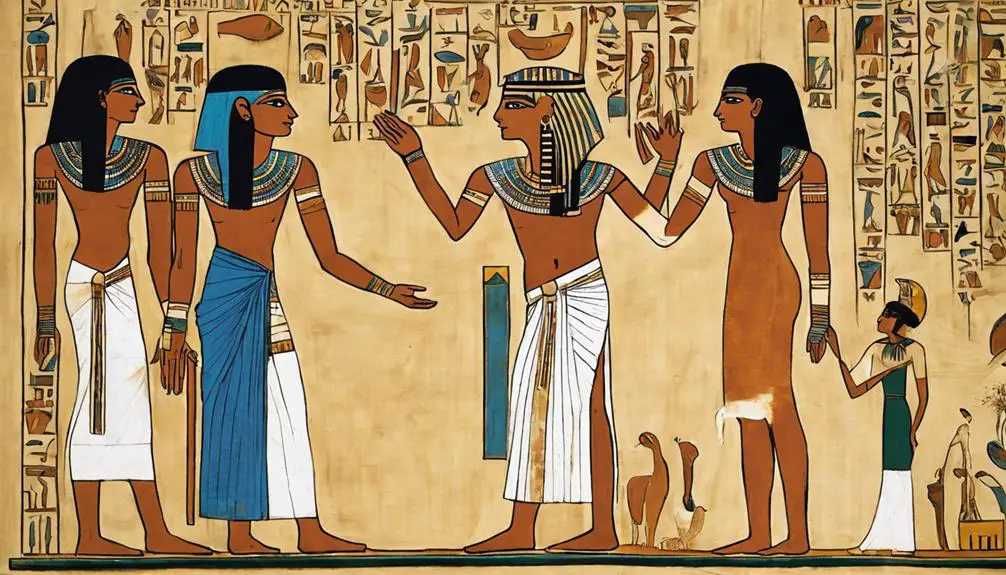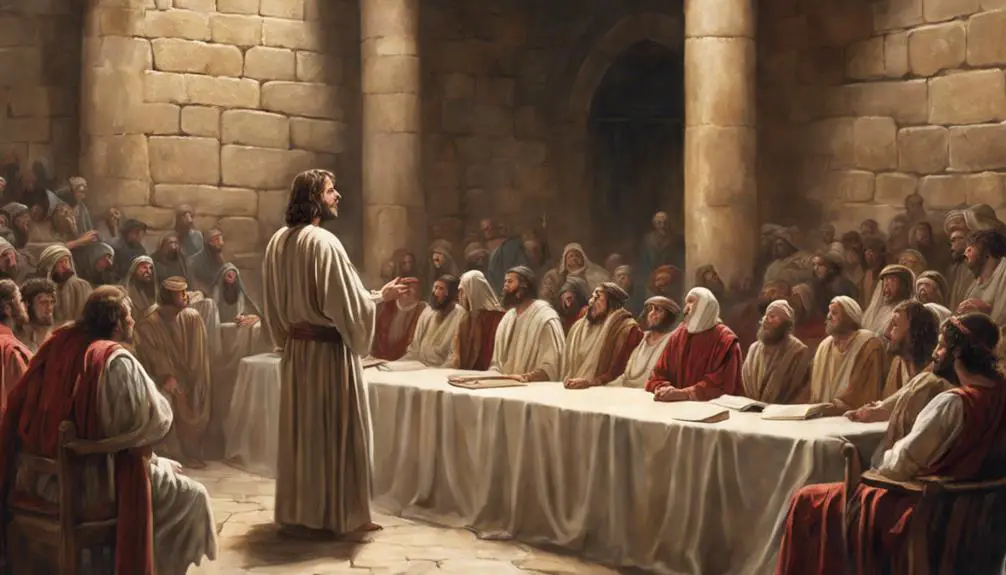Take a riveting journey through biblical narratives, unveiling instances of false witness that shaped history and challenged morals.

Examples of False Witness in the Bible
Innocence and guilt, truth and deception, these contrasting elements often intertwine in the biblical narratives, casting shadows on our understanding of morality.
You've probably come across various instances of false witness in the Bible, where characters lie or manipulate facts for personal gain or protection. But have you ever stopped to analyze these incidents, their implications and their effect on the course of biblical history?
Let's venture together into an exploration of these narratives, unraveling the layers of truth and falsehood that might challenge our perceptions.
The Story of Potipar's Wife

Delving into the story of Potipar's wife, you'll find a striking example of false witness in the Bible, where she makes an unjust accusation against Joseph, a Hebrew slave serving in her household. This tale involves two key elements: the Wife's Temptation and Joseph's Integrity.
As Potipar's wife, she was presumably well off, but she yearned for what she couldn't have: Joseph. This temptation led her to falsely accuse Joseph of attempted rape when he rejected her advances. Her deceitfulness is evident in her manipulation of evidence – Joseph's garment, left behind in his haste to escape her.
In stark contrast, Joseph's integrity shines through. He was a slave, yet he chose to honor his master and his God by resisting temptation. When falsely accused, Joseph didn't resort to lies or deceit. His character remained unblemished despite the false witness against him.
In this story, you see the disastrous consequences of giving in to temptation and the power of maintaining integrity under pressure. Potipar's wife's false witness not only wronged Joseph but also disrupted the household's peace, highlighting the far-reaching effects of dishonesty. Meanwhile, Joseph's integrity, despite his circumstances, offers a timeless example of moral fortitude.
The Trial of Jesus Christ

Similarly, in the trial of Jesus Christ, you encounter another instance of false witness in the Bible, showcasing the gravest implications of false accusations. Here, Christ's accusers play a pivotal role, falsely testifying against Him, leading to His crucifixion.
To help visualize the event, consider the following table:
Stage |
Characters |
Outcomes |
|---|---|---|
Accusation |
Christ's Accusers |
False Testimonies |
Trial |
Pontius Pilate |
Pilate's Dilemma |
Verdict |
Sanhedrin |
Crucifixion |
From the first column, you can see that Christ's accusers were the ones who initiated the false testimonies. Next, the trial, presided over by Pontius Pilate, sets the scene for 'Pilate's Dilemma' – his struggle between knowing Jesus' innocence and the pressure from the Jewish leaders. Lastly, the Sanhedrin, the supreme council, delivered the unjust verdict of crucifixion despite the lack of credible evidence.
This episode underscores the disastrous consequences of false accusations. It's not merely about legal outcomes; rather, it's a matter of life and death, proving the gravity of bearing false witness, a violation of one of the Ten Commandments. This biblical narrative serves as a stern warning against the act of false witness.
Naboth's Vineyard: Ahab and Jezebel

Turning to the story of Naboth's Vineyard, you'll find an equally chilling account of false witness involving Ahab and Jezebel. This tale from 1 Kings 21 exemplifies Ahab's covetousness and Jezebel's manipulation.
Ahab, king of Israel, desired Naboth's vineyard for his own. When Naboth refused to sell, Ahab was distraught. Noticing this, Jezebel, his wife, hatched a sinister plan. She crafted false letters in Ahab's name, set up two scoundrels to bear false witness against Naboth, accusing him of blaspheming God and the king. As a result, Naboth was stoned to death and Ahab took possession of the vineyard.
This account is a stark demonstration of the grave consequences of false witness. It shows how Jezebel's manipulation was able to twist the truth and incite a wrongful execution. It also exposes Ahab's covetousness, his desire for the vineyard blinding him to the unjust means employed to secure it. The story of Naboth's Vineyard serves as a powerful reminder of the Biblical commandment against bearing false witness and the destructive potential when it's ignored.
The Deception of Jacob

Moving from the dark tale of Ahab and Jezebel, let's now explore another biblical narrative involving deceit: the deception of Jacob. Through Jacob's character analysis, you'll discover that he was a complex figure. He was clever, ambitious, and willing to employ deception to achieve his aims. The most notable instance of this is his theft of his elder brother Esau's birthright and blessing.
Esau's betrayal impact was profound. As the eldest, he was entitled to a double portion of the inheritance and the spiritual leadership of the family. However, Jacob's deceitful act stole these privileges from him, creating a deep-seated animosity that shaped the rest of their lives.
Jacob's actions weren't without consequences. He lived a life fraught with difficulties, a testament to the biblical principle that 'whatever a man sows, he'll also reap'. His experiences serve as a warning against the use of deceit to achieve one's objectives.
In understanding the deception of Jacob, we see how the Bible uses the characters' flaws and mistakes to impart lessons. Despite his deceit, Jacob's story is one of redemption, demonstrating that no one is beyond the grace of God.
Ananias and Sapphira's Betrayal

Diving into the New Testament, you'll encounter the disturbing account of Ananias and Sapphira, a couple whose deceit led to dire consequences. Selling a piece of property, they agreed to lie about its price, keeping a portion of the money for themselves and presenting the rest to the apostles as if it were the total payment.
Their deceit represents the consequences of greed. Such greed led to their immediate death when confronted by Peter, sending shockwaves through the early Christian community. Their actions and subsequent punishment had an immense impact on the community, serving as a harsh reminder of the gravity of dishonesty.
Consider the following elements of this account:
- The couple's conspiracy to lie, an act of false witness that betrayed their community's trust.
- The immediate divine judgment they faced, illustrating the severe consequences of greed.
- The fear their punishment instilled in the community, emphasizing the impact of their actions on the community.
Their story reminds you that dishonesty and greed can have far-reaching, devastating effects. Ananias and Sapphira's betrayal illustrates the importance of truthfulness and the potential damage caused by false witness within a community.
Conclusion
In life, just as in these biblical tales, false witness can lead us down treacherous paths. Like a wolf in sheep's clothing, dishonesty can seem harmless but ultimately devours trust and integrity.
Remember, truth is a beacon, guiding us through the fog of deception. So, let's learn from these stories, striving not to bear false witness but to uphold honesty, even when it's difficult.
After all, it's not just divine law, but a fundamental human value.



Sign up